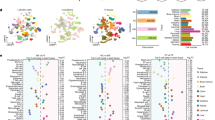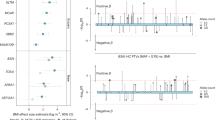Abstract
Genomewide association studies have implicated the CLEC16A gene in several autoimmune diseases, including multiple sclerosis (MS) and type 1 diabetes. However, the most associated single-nucleotide polymorphism (SNP) varies, and causal variants are still to be defined. In MS, two SNPs in partial linkage disequilibrium with each other, rs6498169 and rs12708716, have been validated at genomewide significance level. To explore the CLEC16A association in MS in more detail, we genotyped 57 SNPs in 807 Norwegian MS patients and 1027 Norwegian controls. Six highly associated SNPs emerged and were then replicated in two large independent sample sets (Norwegian and British), together including 1153 MS trios, 2308 MS patients and 4044 healthy controls. In combined analyses, SNP rs12708716 gave the strongest association signal in MS (P=5.3 × 10−8, odds ratio 1.18, 95% confidence interval=1.11–1.25), and was found to be superior to the other SNP associations in conditional logistic regression analyses. Expression analysis revealed that rs12708716 genotype was significantly associated with the relative expression levels of two different CLEC16A transcripts in thymus (P=0.004), but not in blood, possibly implying a thymus- or cell-specific splice regulation.
This is a preview of subscription content, access via your institution
Access options
Subscribe to this journal
Receive 6 digital issues and online access to articles
$119.00 per year
only $19.83 per issue
Buy this article
- Purchase on Springer Link
- Instant access to full article PDF
Prices may be subject to local taxes which are calculated during checkout


Similar content being viewed by others
References
Hakonarson H, Grant SF, Bradfield JP, Marchand L, Kim CE, Glessner JT et al. A genome-wide association study identifies KIAA0350 as a type 1 diabetes gene. Nature 2007; 448: 591–594.
International Multiple Sclerosis Genetics Consortium (IMSGC). Risk alleles for multiple sclerosis identified by a genomewide study. N Engl J Med 2007; 357: 851–862.
Wellcome Trust Case Control Consortium. Genome-wide association study of 14 000 cases of seven common diseases and 3000 shared controls. Nature 2007; 447: 661–678.
International Multiple Sclerosis Genetics Consortium (IMSGC). The expanding genetic overlap between multiple sclerosis and type I diabetes. Genes Immun 2009; 10: 11–14.
Marquez A, Varade J, Robledo G, Martinez A, Mendoza JL, Taxonera C et al. Specific association of a CLEC16A/KIAA0350 polymorphism with NOD2/CARD15(-) Crohn's disease patients. Eur J Hum Genet 2009; 17: 1304–1308.
Rubio JP, Stankovich J, Field J, Tubridy N, Marriott M, Chapman C et al. Replication of KIAA0350, IL2RA, RPL5 and CD58 as multiple sclerosis susceptibility genes in Australians. Genes Immun 2008; 9: 624–630.
Skinningsrud B, Husebye ES, Pearce SH, McDonald DO, Brandal K, Boe WA et al. Polymorphisms in CLEC16A and CIITA at 16p13 are associated with primary adrenal insufficiency. J Clin Endocrinol Metab 2008; 93: 3310–3317.
Skinningsrud B, Lie BA, Husebye ES, Kvien TK, Forre O, Flato B et al. A CLEC16A variant confers risk for juvenile idiopathic arthritis and anti-CCP negative rheumatoid arthritis. Ann Rheum Dis 2009; 69: 1471–1474.
Todd JA, Walker NM, Cooper JD, Smyth DJ, Downes K, Plagnol V et al. Robust associations of four new chromosome regions from genome-wide analyses of type 1 diabetes. Nat Genet 2007; 39: 857–864.
Geijtenbeek TB, Gringhuis SI . Signalling through C-type lectin receptors: shaping immune responses. Nat Rev Immunol 2009; 9: 465–479.
Hoppenbrouwers IA, Aulchenko YS, Janssens AC, Ramagopalan SV, Broer L, Kayser M et al. Replication of CD58 and CLEC16A as genome-wide significant risk genes for multiple sclerosis. J Hum Genet 2009; 54: 676–680.
Barrett JC, Fry B, Maller J, Daly MJ . Haploview: analysis and visualization of LD and haplotype maps. Bioinformatics 2005; 21: 263–265.
International HapMap Consortium 2007. A second generation human haplotype map of over 3.1 million SNPs. Nature 2007; 449: 851–861.
Martinez A, Perdigones N, Cenit M, Espino L, Varade J, Lamas JR et al. Chromosomal region 16p13: further evidence of increased predisposition to immune diseases. Ann Rheum Dis 2010; 69: 309–311.
Zoledziewska M, Costa G, Pitzalis M, Cocco E, Melis C, Moi L et al. Variation within the CLEC16A gene shows consistent disease association with both multiple sclerosis and type 1 diabetes in Sardinia. Genes Immun 2009; 10: 15–22.
Bronson PG, Ramsay PP, Seldin MF, Gregersen PK, Criswell LA, Barcellos LF . A candidate gene study of CLEC16A does not provide evidence of association with risk for anti-CCP-positive rheumatoid arthritis. Genes Immun 2010; 11: 504–508.
Perera D, Stankovich J, Butzkueven H, Taylor BV, Foote SJ, Kilpatrick TJ et al. Fine mapping of multiple sclerosis susceptibility genes provides evidence of allelic heterogeneity at the IL2RA locus. J Neuroimmunol 2009; 211: 105–109.
Nejentsev S, Walker N, Riches D, Egholm M, Todd JA . Rare variants of IFIH1, a gene implicated in antiviral responses, protect against type 1 diabetes. Science 2009; 324: 387–389.
Zuvich RL, McCauley JL, Oksenberg JR, Sawcer SJ, De Jager PL, Aubin C et al. Genetic variation in the IL7RA/IL7 pathway increases multiple sclerosis susceptibility. Hum Genet 2010; 127: 525–535.
Bronson PG, Caillier S, Ramsay PP, McCauley JL, Zuvich RL, De Jager PL et al. CIITA variation in the presence of HLA-DRB1*1501 increases risk for multiple sclerosis. Hum Mol Genet 2010; 19: 2331–2340.
McDonald WI, Compston A, Edan G, Goodkin D, Hartung HP, Lublin FD et al. Recommended diagnostic criteria for multiple sclerosis: guidelines from the International Panel on the diagnosis of multiple sclerosis. Ann Neurol 2001; 50: 121–127.
Poser CM, Paty DW, Scheinberg L, McDonald WI, Davis FA, Ebers GC et al. New diagnostic criteria for multiple sclerosis: guidelines for research protocols. Ann Neurol 1983; 13: 227–231.
de Bakker PI, Yelensky R, Pe’er I, Gabriel SB, Daly MJ, Altshuler D . Efficiency and power in genetic association studies. Nat Genet 2005; 37: 1217–1223.
Purcell S, Neale B, Todd-Brown K, Thomas L, Ferreira MA, Bender D et al. PLINK: a tool set for whole-genome association and population-based linkage analyses. Am J Hum Genet 2007; 81: 559–575.
Dudbridge F . Likelihood-based association analysis for nuclear families and unrelated subjects with missing genotype data. Hum Hered 2008; 66: 87–98.
Acknowledgements
We would like to thank all MS patients and healthy controls for their participation in the study. The study is funded by grants from The South-Eastern Norway Regional Health Authority, the Research Council of Norway; Scientific Advisory Council Ullevål, Oslo University Hospital; Norwegian Foundation for Health and Rehabilitation, the Norwegian Diabetes Association, the Oslo MS Association and the Odd Fellow MS society. We thank all contributors to the collection of samples and clinical data in the Norwegian MS Registry and Biobank. The Norwegian MS Registry and Biobank is supported by the Research Council of Norway, Haukeland University Hospital and Western Norway Regional Health Authority. The Norwegian Bone Marrow Donor Registry, Rikshospitalet, Oslo University Hospital are acknowledged for providing Norwegian controls. Harald Lindberg is thanked for collection of thymus samples. The Centre for interactive genetics; Cigene, Norwegian University of Life Sciences (UMB) AAs is thanked for performing Sequenom analyses. The University of Cambridge and colleagues at the Department of Clinical Neuroscience Addenbrooke's hospital are acknowledged for laboratory assistance and much appreciated collaboration in connection with the research stay of IL Mero in this department. This study makes use of data generated by the Wellcome Trust Case-Control Consortium. A full list of the investigators who contributed to the generation of the data is available from www.wtccc.org.uk. Funding for the project was provided by the Wellcome Trust under award 076113. We acknowledge use of DNA from the British 1958 Birth Cohort collection, funded by the Medical Research Council Grant G0000934 and the Wellcome Trust Grant 068545/Z/02. This work was also supported by the Medical Research Council (G0700061), the Wellcome Trust (084702/Z/08/Z) and the Cambridge NIHR Biomedical Research Centre.
Author information
Authors and Affiliations
Corresponding author
Ethics declarations
Competing interests
The authors declare no conflict of interest.
Additional information
Supplementary Information accompanies the paper on Genes and Immunity website
Supplementary information
Rights and permissions
About this article
Cite this article
Mero, IL., Ban, M., Lorentzen, Å. et al. Exploring the CLEC16A gene reveals a MS-associated variant with correlation to the relative expression of CLEC16A isoforms in thymus. Genes Immun 12, 191–198 (2011). https://doi.org/10.1038/gene.2010.59
Received:
Revised:
Accepted:
Published:
Issue Date:
DOI: https://doi.org/10.1038/gene.2010.59
Keywords
This article is cited by
-
CLEC16A interacts with retromer and TRIM27, and its loss impairs endosomal trafficking and neurodevelopment
Human Genetics (2023)
-
Analysis of Associations of Genetic Predisposition Markers Identified in Genome-Wide Studies with Multiple Sclerosis
Neuroscience and Behavioral Physiology (2021)
-
Clarifying the function of genes at the chromosome 16p13 locus in type 1 diabetes: CLEC16A and DEXI
Genes & Immunity (2020)
-
The type 1 diabetes candidate gene Dexi does not affect disease risk in the nonobese diabetic mouse model
Genes & Immunity (2020)
-
Polymorphic Variants of Immune Response Genes as a Risk Factor for the Development of Primary Progressive Multiple Sclerosis
Neuroscience and Behavioral Physiology (2018)



